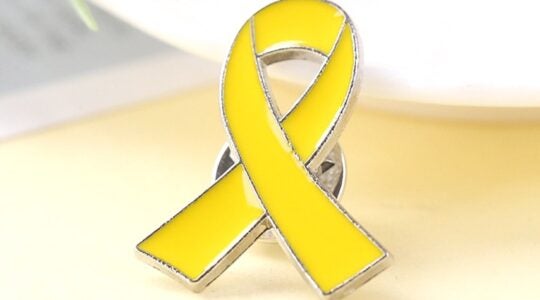TORONTO, Dec. 25 (JTA) — Mordechai’s community and friends are still adjusting to his decision to become Nicole — some better than others.
Mordechai used to be known in his Toronto Orthodox community as Nord, short for Nord the Barbarian, which referred to his girth and hairiness. He now wishes to be called Nicole, and has chosen Neshama, or Soul, as a Hebrew name. Nicole would like to remain part of the community.
“My earliest memory is crying myself to sleep, wishing and hoping and praying to God that I would wake up a girl,” she said. “But I thought all boys must feel like that.”
Growing up and attending boys yeshivas, however, that hope “couldn’t exist, so it got buried” — until right after her honeymoon three years ago.
“On a scale of 1 to 10, it went from 3 or 5 to 1,000,” Nicole said of her gender dysphoria. “I couldn’t function or focus on anything else. It became a very real threat to my life. When I got enough of a handle on it to tell [my wife] a few months later, we cried for hours. We cried a lot for two-and-a-half years.”
They searched for alternatives, including reorientation therapy with a psychiatrist affiliated with a group called Jews Offering New Alternatives to Homosexuality.
Last fall, however, Nicole began a trial on hormone therapy. In June, when it became clear that transition was inevitable — and the results of the hormones were becoming apparent — Mordechai gave his wife a get, or Jewish divorce, and started to live life as Nicole.
What has rocked the Toronto community, and is being followed closely in the transsexual community, is that rather than simply disappearing, Nicole has been open about her condition and is the first person to transition “in place” within an Orthodox community.
“Gender dysphoria is not something I chose, and for me transition is about survival, not comfort or happiness,” Nicole said. “I believe that survival is a moral and halachic imperative, and I hoped my family and friends would want the opportunity to be here for me. I know it will take time. And I know some people won’t want to deal with it. But I wasn’t willing to write everybody else off.”
“It takes guts to transition, but something else to do it ‘in place,’ ” said one Orthodox transwoman from the Midwest who uses the Internet pseudonym Beth Orens. “When I think about it, it gives me the willies. She’s got courage that’s completely unbelievable.”
But Orens thinks Nicole might have been overly optimistic.
“On the one hand, to hell with people who are obnoxious. Everyone has the right to live their life,” Orens said. “But people were horrendous on her blog, absolutely vile. They made everything into ‘if you’re sick, get some help, but don’t expect us to cheer you on.’ Or, ‘people who tell you this is OK are not really your friend.’ ”
Nicole soon disabled the comments section of her online journal. What upset her most were comments from an anonymous source that were particularly harsh — and, it turned out, came from her sister.
Nicole’s sister won’t speak with her anymore, and her brother is apprehensive about seeing her. In deference to her family, Nicole wouldn’t allow her last name to be used in this article.
Nicole described her parents as torn between their love and support for her as a person and their desire to limit her transition’s impact on the family.
“They’ve also had to deal with the reaction of a community which feels that I am something they should be ashamed of,” she said.
Even if they’d like to be supportive, accepting Nicole is a difficult adjustment for everybody who was touched by Mordechai.
“A gender change is not minimal,” said Gav Martell, a friend of Nicole’s since high school. “It’s different in terms of relating. You go for coffee instead of going for beers after playing hockey — and I don’t go out for coffee or beer with women by myself.”
He also had to consider what to tell his three young children, who know Nicole.
“Do I need to expose my five-and-a-half-year-old daughter to this? Why do I have to give her the option that she might say she wants to be a boy now?” Martell asked. “It’s not normal. In a normal, nonreligious society, there would be issues, too.”
Travis Kearns, a friend of Nicole’s from law school who is not Jewish but plays on a mostly Orthodox hockey team, called Nicole’s transition “well outside the ordinary.”
“I’m far more liberal than anyone in the Orthodox community, but I understand why it was such a shock to them,” Kearns said, adding that “these types of things resonate more powerfully” in the Orthodox community.
Kearns feels like he mourned his lost friendship with Mordechai.
“I loved him dearly and I miss him,” he said. “But on a different level, Nord is still Nord. The core things are there, just in a different package.”
“I’m not a progressive by any means,” said Gershon Miskin, a childhood friend of Nicole’s. “I’m a pretty religious guy. But he’s not making excuses for himself. It was a question of life and death. From what I understand, he would have thrown himself in front of a train. I truly believe that.”
In terms of Nicole’s future in the Toronto community, Miskin said “it will be easier for people to acclimate if he has the opportunity to ‘see and be seen,’ if he would be invited out to gatherings. It would be strange and weird, but people would get used to it.”
He also expressed regret that rabbis and community leaders have failed to act in what he called a “statesmanlike way,” and that any overtures to them that Nicole has made have been met with silence.
“I know they’re human and never had to deal with anything like this before,” Miskin said. “But nobody wants to touch this one.”
It remains to be seen how the community will adapt to Nicole’s transition and to what extent she’ll be able to reintegrate. Though she hasn’t yet gone to synagogue in a place where people might know her, the issue ultimately may not be which side of the mechitza Nicole sits on.
“I don’t care as much about being ‘accepted’ as a woman, and I have limited influence over whether or not I am,” Nicole said. “But a baseline acceptance as a human being and a Jew would be nice.
“I’m not trying to make a political statement and I don’t want to be in anybody’s face. But no person should be made to disappear.”
JTA has documented Jewish history in real-time for over a century. Keep our journalism strong by joining us in supporting independent, award-winning reporting.





